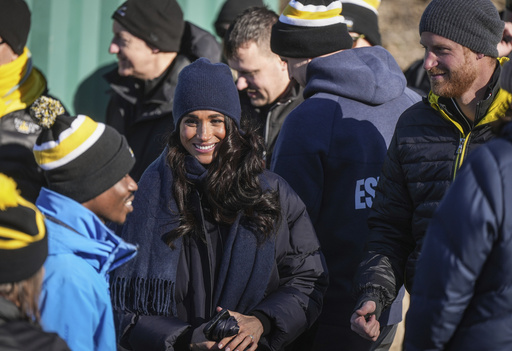WHISTLER, British Columbia (AP) — Prince Harry raced head-first on a tiny skeleton sled going 99 kph (61.5 mph) down a track at next year’s Invictus Games site Thursday, saying with a smile afterward that everyone should do it.
Harry was in Whistler, British Columbia, with wife Meghan, the Duchess of Sussex, to visit athletes at training camps and to promote the games he founded for wounded, injured or sick service personnel and veterans after he served in Afghanistan.
The British prince did two runs on one of the world’s fastest bobsled tracks, which also hosts skeleton races. The 2025 games in Vancouver and Whistler will be the first to feature winter sports, including the skeleton, skiing events and wheelchair curling, but it will also host events it has previously, such as indoor rowing, sitting volleyball, swimming, wheelchair rugby and wheelchair basketball.
Cowbells rang out as the prince finished his first run, and when he was helped off the track, he took off his helmet and said with a smile that “everyone should do this, it should be compulsory.”
Meghan was waiting at the bottom of the track after both of his runs.
“Meghan, you’ve got to go,” someone shouted. “No way,” she replied.
Experienced sliders start at the top of the track, although the prince started at the halfway mark. He was given a safety briefing first, and medics were standing by.
American Ivan Morera, a single-arm amputee who was wounded in a combat zone in Afghanistan, was in Whistler for the training camp. He said he appreciated Harry giving service members an opportunity to find purpose after injury.
“I’m continuously recovering from this injury, maybe not physically, but emotionally, mentally,” Morera said in an interview. “A big catastrophic event like that affects you, so adaptive sports is my way of dealing with that.”
The 2025 games will have about 500 competitors from 23 nations from Feb. 8-16, 2025.
This website uses cookies so that we can provide you with the best user experience possible. Cookie information is stored in your browser and performs functions such as recognising you when you return to our website and helping our team to understand which sections of the website you find most interesting and useful.
